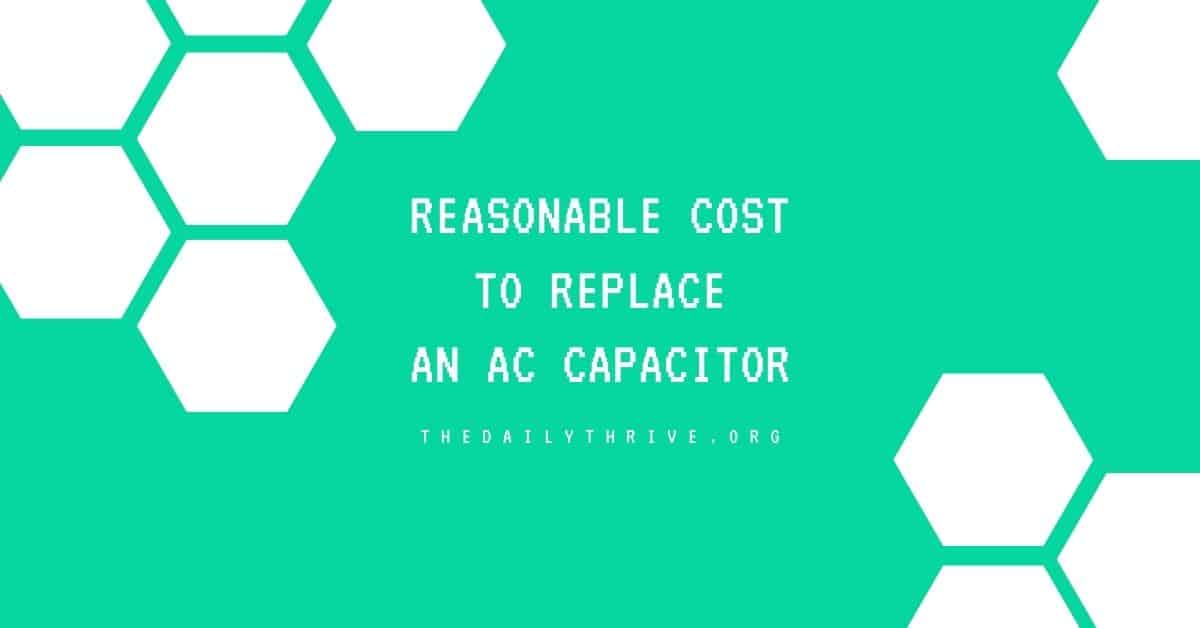An AC capacitor cost is somewhere between $12 and $55 for the part alone. The price you pay will depend on the model, voltage and brand, as branded units are more costly. The reasonable cost to replace an AC capacitor is between $100 and $225.
What is often asked by homeowners is why the cost to replace an AC capacitor can be so high, while the price of the part itself is very cheap?
Remember that when you hire an HVAC contractor to replace an air conditioner capacitor, you’re not just paying for the part.
What you are buying with professionals is their knowledge of which specifications and choosing the right replacement parts. You are also paying for the the labor and immediacy of the solution.
What Is an AC Capacitor?
One of the vital part of AC system is a capacitor and replacing capacitors is the most frequently performed task by HVAC technicians. Capacitor gives your AC system the early charge to turn on, it collects and stockpiles energy that kickstarts when it starts a new cycle and provides continuous power to keep an air conditioner running.
A bad capacitor can cause your HVAC system to consume a large amount of electricity and you end up with higher energy bills.
AC Capacitor Types
Air conditioners often will have two capacitors: “start” and “run”. These have slightly different requirements, but for the purposes of this post can be considered to be equivalent.
A run capacitor have two categories:
- Single run capacitor – has 2 terminals and starts one motor at a time.
- Dual run capacitior – has 3 terminals and can start multiple motors.
Dual AC capacitor cost is expensive than single run capacitor as most HVAC technicians prefer using it because it saves space and is simpler to replace.
Causes of Capacitor Malfunction
The capacitor, just like other parts of the AC, is subject to malfunctions. Here are some of the common causes of capacitor malfunctions.
Overheating
The AC capacitor is made of delicate materials that can withstand specific temperatures. At higher temperature and higher voltage, the capacitors will fail more quickly. The temperature can be influenced by dust and debris (insulating the capacitor) in the compressor unit.
Overloading
There is a limit of electrical charges that electrical capacitors can store, and this is the same limit of power that they can discharge (produce). The charge-storing ability of a capacitor is known as its capacitance.
An AC capacitor will overload when you try to draw too much power than its capacitance can provide. For example, if you use a lower-rated capacitor than the AC requires. Such overloading can easily lead to capacitor damage.
Aging
Lastly, a capacitor loses some of its capacitance every time you charge and discharge it. Over time, the wear and tear of the charge and discharge cycles accumulate, and the capacitor becomes unable to provide the capacitance your AC requires to start.
A Bad Capacitor Symptoms
Seeing how critical the capacitor is to your AC’s operations, you should know if your AC capacitor starts to act up. Below are some of the signs of a bad capacitor you need to watch out for.
Starting Difficulties
Since the main function of the capacitor is to start the AC motor, difficulties during start-up are the classic signs of capacitor malfunction. The AC might fail to start at all or start with some difficulties if the capacitor has malfunctioned.
High Energy Bills
The capacitor stores electricity that it discharges to give the AC whenever the AC starts up. If the capacitor has malfunctioned, the AC will have to draw power from the mains during start-up. It will translate into higher-than-usual power consumption and charges.
Humming Sound From the AC
The AC will struggle to start if it can’t get power from the capacitor during start-up. You may hear the struggles in terms of humming sounds whenever the AC starts up.
Another common signs are:
- Air Conditioner does not turn on
- Air Conditioner stops and starts abruptly
- Air Conditioner delayed in beginning a cooling cycle
- Air Conditioner sounds like it’s running but no cool air comes out
- Burning smell or smoke coming from your Air Conditioner
- Your energy bills are high
What will a bad capacitor do?
A bad capacitor could impact the entire performance of your AC system. It stops the condenser unit from working on, which means the cooling process can’t be performed. You should check your capacitor regularly and replace when it goes bad. By doing this, you can save money on your energy bills and prolong the life of your air conditioning unit.
AC Capacitor Replacement
Replacing an AC capacitor is not a DIY job, because these high voltage devices can cause serious injury, even when the power is shut off.
DIY AC Capacitor Replacement
If you think it’s something you would be comfortable changing on your own, an AC capacitor cost will be very cheap. Here are step by step on how to replace an AC capacitor.
You can take the cover off your condenser and look at the model number/capacity of the capacitor. You may have one capacitor or a dual run capacitor, that’s for both the compressor and fan, or you may have a capacitor for each. Just buy the same exact capacitor if you can find it, or just ones with the same microfarad ratings.
Discharge the old capacitor and wires and replace with the new one. Easy isn’t it? An AC capacitor is one of the most common causes of air conditioning problem, replacing it is simple.
AC Capacitor Cost
AC capacitor prices are range between $12 and $55 for the part only.
You will probably never get the cheap ac capacitor prices as a professional as you don’t buy as much as they do.
A reasonable cost to replace an ac capacitor by professional is between $100 – $250.
Some homeowners have to overpay for an AC capacitor replacement, and that is why they are choose to go DIY. But, due to the risks involved when replacing an AC capacitor, it’s prefer that you contact an HVAC technician to ensures the job is done safely and correctly.
Conclusion
As a retired HVAC technician, I found most failed capacitor issues involved blocked or dirty condensate coils, causing the compressor to draw more amperage. To extend the life of an AC capacitor, always check first your condensate (outside unit) coil. If it is dirty, unscrew the grill/fence around the unit and clean it with water.
Also, keep in mind that that dirty coils and/or improper charges will cause the air conditioning system to be less efficient.
So, if you want a longer-life capacitor in the future, keep your air conditioner unit clean and well maintained. Also, you could install a whole-house surge suppressor to reduce power supply surges.






